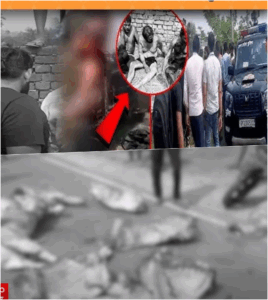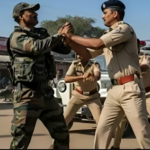Aligarh Mob Lynching: The Shocking Case of Innocent Victims and Misplaced Fury
In a chilling incident that shook the town of Aligarh, Uttar Pradesh, four young men were brutally beaten by a mob, leaving them bloodied and scarred both physically and emotionally. The accused attackers, allegedly linked to Hindu organizations, accused the men of transporting cow meat—a charge that has now been proven false, adding a shocking twist to an already horrifying case of mob violence.
.
.
.

The Incident: A Violent Encounter
It was an ordinary day for the four young men, who were traveling in their vehicle, carrying meat for delivery. Little did they know that their journey would turn into a nightmare. A group of individuals, reportedly associated with Hindu organizations, stopped their vehicle, suspecting that the meat they were transporting was beef.
Before the young men could explain themselves, the mob descended upon them with sticks, rods, and fists. The violence was brutal and unrelenting. The victims, drenched in their own blood, pleaded for mercy, repeatedly insisting on their innocence. But their cries fell on deaf ears as the mob continued their assault, fueled by anger and a misplaced sense of justice.
Eyewitnesses described the horrifying scene: the young men’s heads were split open, their bodies covered in deep, bleeding wounds. The mob’s fury did not stop there—they set the victims’ vehicle on fire, destroying the very evidence that could have cleared their names.
The Aftermath: A Fight for Justice
After the mob dispersed, the injured men were rushed to the hospital, their conditions critical. The police launched an investigation into the incident, arresting four individuals allegedly involved in the attack. However, the damage had already been done—not just to the victims’ bodies, but also to the fragile social fabric of the community.
The case took a dramatic turn when the police received the lab report on the meat that had been in the victims’ vehicle. The report categorically stated that the meat was not beef, as alleged by the mob, but belonged to another animal. This revelation turned the case on its head, proving that the victims were innocent and had been targeted based on false assumptions.
The Role of Misinformation and Prejudice
This incident is yet another grim reminder of the dangers of mob mentality, fueled by misinformation and deep-seated prejudices. In many parts of India, cow slaughter is a highly sensitive issue, with strict laws in place to prevent it. However, these laws have often been misused by vigilante groups to target individuals, particularly from minority communities, based on mere suspicion.
In this case, the mob acted as judge, jury, and executioner, punishing the victims without any evidence of wrongdoing. Their actions were not only illegal but also deeply inhumane, highlighting the urgent need for stricter enforcement of laws against mob violence.
The Victims’ Plight
For the four young men, this ordeal has left scars that will take a long time to heal. Speaking to reporters from their hospital beds, they recounted the horror of being beaten mercilessly while trying to defend themselves. “We kept telling them we were innocent, that the meat was not beef, but they wouldn’t listen. They just wanted to hurt us,” one of the victims said, his voice trembling with emotion.
Their families, too, are struggling to come to terms with what happened. “My son is not a criminal. He was just doing his job. What happened to him is inhuman,” said the father of one of the victims, tears streaming down his face.
The Police Investigation
Following the lab report, the police have intensified their investigation into the incident. Four individuals have been arrested so far, and more arrests are expected as the probe continues. “The lab report has confirmed that the meat was not beef. We are taking strict action against those involved in the attack,” a police official said.
The police have also faced criticism for their initial handling of the case. Many have questioned why the mob was allowed to take the law into their own hands, and why the police did not intervene sooner to prevent the violence. This incident has once again highlighted the need for better training and resources for law enforcement to handle such situations effectively.
A Community Divided
The incident has left the community deeply divided. While some have condemned the mob’s actions, others have defended them, arguing that they were acting to protect their religious beliefs. This polarization has only deepened the mistrust and tension between different groups in the area.
Religious leaders and activists have called for calm and unity, urging people not to let this incident escalate into further violence. “This is not about religion. This is about humanity. We must stand together and ensure that such incidents do not happen again,” said a local activist at a peace rally organized in the aftermath of the attack.
The Larger Implications
The Aligarh mob lynching is not an isolated incident. In recent years, there has been a disturbing rise in cases of mob violence across India, often linked to rumors and misinformation spread through social media. These incidents have raised serious questions about the state of law and order in the country, as well as the role of social media in fueling violence.
Experts have called for stricter laws to curb mob violence and hold perpetrators accountable. “Mob lynching is a crime, and it must be treated as such. The government needs to send a strong message that such actions will not be tolerated,” said a legal expert.
Voices of Condemnation
The incident has drawn widespread condemnation from various quarters. Human rights organizations have criticized the mob’s actions, calling them a blatant violation of the victims’ rights. “This is not justice; this is barbarism. The victims were innocent, and they have suffered for no reason. We demand justice for them,” said a spokesperson for a prominent human rights group.
Political leaders, too, have weighed in on the issue. While some have condemned the violence, others have remained silent, reflecting the political sensitivities surrounding the issue of cow protection. This silence has been criticized by many, who see it as a tacit endorsement of mob violence.
The Way Forward
As the investigation continues, the focus now shifts to ensuring justice for the victims and preventing such incidents in the future. Activists and community leaders have called for better awareness and education to combat misinformation and prejudice. They have also emphasized the need for stronger laws and better enforcement to deter mob violence.
For the victims and their families, the road to recovery will be long and difficult. But they remain hopeful that justice will be served, and that their ordeal will not be in vain. “We just want the truth to come out. We want the people who did this to us to be punished,” said one of the victims.
Conclusion
The Aligarh mob lynching is a stark reminder of the dangers of mob mentality and the urgent need for systemic reforms to address it. It is a story of innocent lives shattered by violence, of a community struggling to heal, and of a nation grappling with the challenges of justice and equality.
As the dust settles, one thing is clear: this incident is not just about four young men and a mob. It is about the kind of society we want to build—a society where justice prevails over prejudice, and humanity triumphs over hatred. The Aligarh case is a wake-up call for all of us to stand against mob violence and work towards a more just and compassionate world.
News
Missing PG Student Monica from Darbhanga CM College Found in Shocking Condition—Police Stunned
Missing Darbhanga CM College Student Monica Found Safe—Reveals She Left Home Willingly to Marry A week-long mystery surrounding the disappearance…
Chaos on the Kanwar Yatra: Devotees Go on Rampage, Vandalize Dhaba from Muzaffarnagar to Roorkee!
Kanwar Yatra Turns Violent: Kanwariyas Vandalize Dhabas from Muzaffarnagar to Roorkee Over Onion in Food A shocking wave of violence…
Uproar After Samajwadi Party Leader Sunil Yadav’s Death: Ex-MLA and Brother-in-Law Named in FIR!
Uproar in Sultanpur After Samajwadi Party Leader Sunil Yadav’s Mysterious Death: Former MLA and Brother-in-Law Named in FIR A wave…
Shocking Viral Video: Teacher Beats Student with Stick in Bihar School—Discipline or Violence?
Bihar School Turns Battleground: Viral Video Shows Teacher Beaten Brutally by Angry Parents—Discipline or Violence? A shocking video has taken…
Forced to Strip at Knifepoint: Obscenity in the Name of Jobs—What’s Happening in Uttar Pradesh?
Job Promise Turns Nightmare: Woman Forced to Undress at Knifepoint in Uttar Pradesh Official’s Quarters Uttar Pradesh: A shocking video…
UP Education Minister Injured in Road Accident as Convoy Cars Collide
UP Education Minister Gulab Devi Injured in Road Accident as Convoy Cars Collide Hapur, Uttar Pradesh: Uttar Pradesh’s Education Minister,…
End of content
No more pages to load












